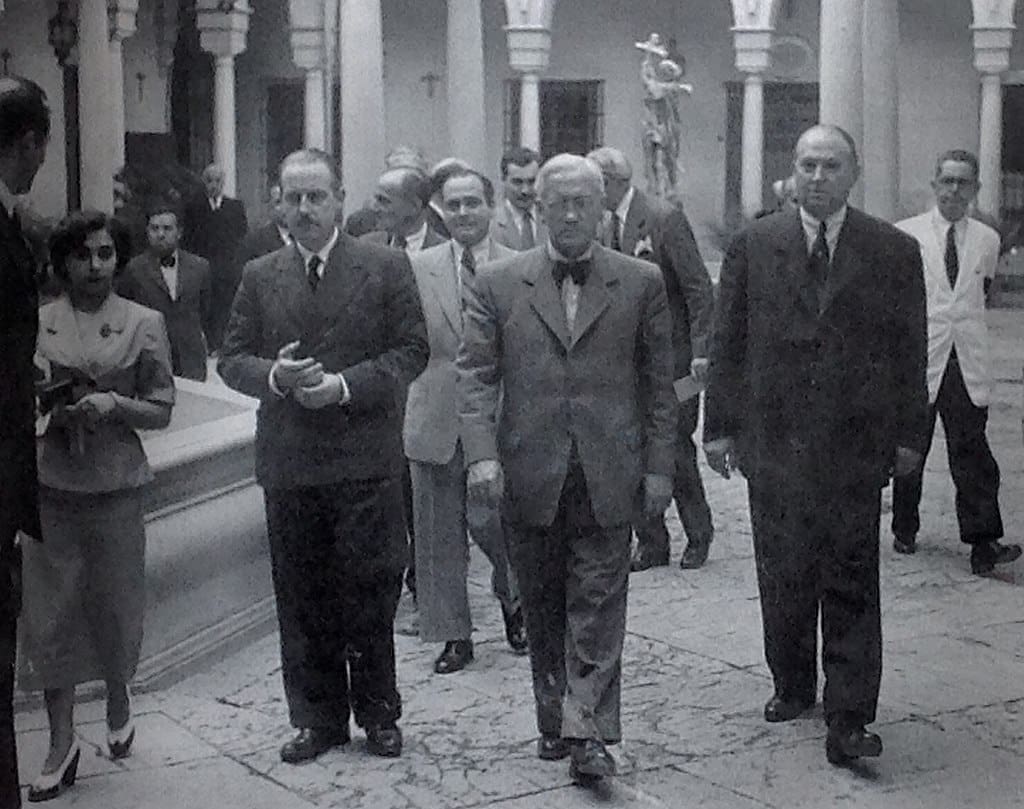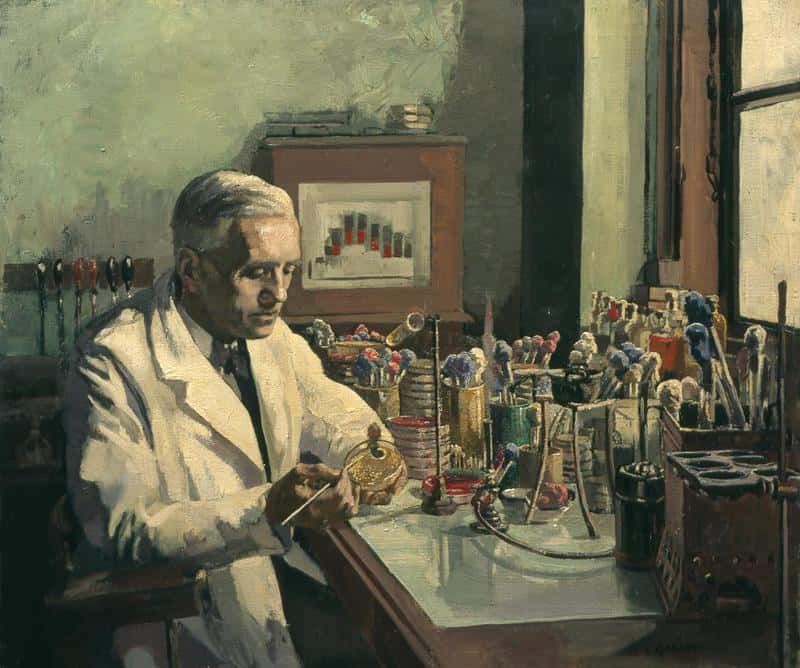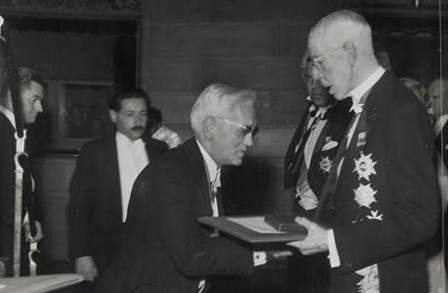Top 15 remarkable facts about Sir Alexander Fleming
*Originally published by Angelah on March 2020 and Updated by Vanessa in October 2022 and Updated by Vanessa R in November 2023
People in the medical field will be more familiar with this name. Sir Alexander Fleming. He might also sound familiar to many people who know him as a biologist, born in Darvel, Scotland in the United Kingdom. He brought to the medical field one of the most helpful discoveries of all time.
Here are 15 things that will help you know him better, whether you know him or not!
1. He discovered penicillin by accident

Sample of penicillin mold presented by Alexander Fleming to Douglas Macleod, 1935- Image: Wikimedia Commons
Penicillin was a mould which accidentally turned a fascinating discovery. Fleming discovered a mold that was in the form of a juice, that formed on a petri dish that had Staphylococcus culture in which he had been placed on a window. The ‘juice’, he observed, destroyed bacteria, and he named it Penicillin. The drug is still widely used, though it has come across resistance in some parts of the world, it is still used as a cure for respiratory infections such as pneumonia and acute exacerbations.
2. He served in World War 1
Sir Alexander Fleming served as a captain in the Army Medical Corps; he was mentioned in dispatches and returned to St Mary’s in 1918, where he had been a lecturer. He was knighted in 1944. Karl was elected as professor of the St Mary’s school in 1928 and served as Emeritus Professor of Biology at the University of London in 1943.
He was also a member of the Territorial Army where he served as a Private between 1900 to 1914 in the London Scottish Regimen.
3. He received adequate education in his twenties
Sir Alexander Fleming was born into a peasant family and could not afford to go to school. He worked at a shipping office in London where he moved to when he was 13; as he attended the Royal Polytechnic Institution since he could not afford to go to a private university. He, after some time, inherited some money from an uncle who passed on and he was able to enroll at St Mary’s Hospital Medical School where he graduated with an MBBS Degree in 1906 and later with an MSC in Bacteriology in 1908.
4. His discoveries were not taken seriously.
When he discovered Penicillin, Sir Fleming’s work was ignored by everyone, mostly because they did not yield positive results when tried. He had even published his work. The development of penicillin from the mould was also a very slow and tedious process and therefore was not given much thought; even he halted his discoveries on it for a while.
5. Nobel Peace Prize
In 1945 Sir Fleming received a Nobel Peace Prize together with two other scientists Ernst Boris Chain and Howard Florey. Interestingly, the two scientists continued research on penicillin after Sir Fleming had abandoned it, and were able to master how to produce it in large quantities and make improvements on it. They would have received the Nobel Peace Prize with Norman Heatley and Edward Abraham, but rules indicate that not more than three persons can receive one Nobel Peace Prize at a go.
6. He painted using bacteria!
Imagine going to an art gallery and seeing Sir Alexander Fleming’s name on a painting. That will not be the most astonishing thing. The fact that he painted using bacteria would be it! Painter James McNeal Whistler urged the microbiologist to join a private art club, Chelsea Art Club, where the scientist painted using germs. Each species was painted using a different colour of bacteria and the colours only became visible one the bacteria developed in the canvas! This is cool!
7. Antiseptics weren’t so useful after all!
During the First World War, Sir Fleming served in the Royal Army Medical Corps, attending to wounded soldiers. It was during this time that he realized that while antiseptics worked perfectly well on shallow wounds, it was killing soldiers who had deep and more serious wounds. This was because he found out, the antiseptics were destroying both the good and the bad bacteria. The good bacteria are good in protecting the body and the antiseptics were destroying these as well.
There was no alternative on what to use, therefore treatment continued anyway!
8. He completed school at the age of 16!
His academic life was very interesting. He received a scholarship at the age of 11, to join the Kilmarnock Academy when his academic prowess was discovered. He studied there for two years then moved to London. Before that, he used to go on foot to school, the Darvel Academy which was an eight-mile trip! His first studies in London at the Polytechnic were actually in Business and Commerce!! He performed extremely well, so much so that the school moved him, two classes, forward so that he graduated at age 16! He got a job at a shipping company, which he did not enjoy and decided to study medicine. He passed his exams well and enrolled at the St Mary’s Hospital Medical School.
9. Published papers
During his active research years, he wrote a series of research papers and publications in the area of bacteria, the use of antibiotics and also the immune system. He published works on bacteriology, chemotherapy, lysozymes, penicillin, and immunology.
10. Awards and Honors
Apart from the Nobel Peace Prize, Fleming received many other notable prizes. He was knighted in 1944 to become Sir Alexander Fleming. Fleming Museum was also built in his honor and also for his discoveries; the Hunterian Professorship by the Royal College of Surgeons of England was awarded to him, he also made it to Times Magazine as one of the 100 Most Important People of the 20th Century, as well as being British Broadcasting Corporation’s list of 100 Greatest Britons in2002. His image appears on the new 5 Pound notes also, as provided by the Clydesdale Bank!
He married Sarah Marion McElroy in 1915. She died in 1949, and their son Robert became a general medical practitioner. In 1953, he married Dr Amalia Koutsouri-Voureka. He died in 1955 of a heart attack.
11. Remarkable facts about Sir Alexander Fleming
Thanks to the recommendation of the painter James McNeil Whistler, Fleming became a member of the exclusive Chelsea Arts Club. He created artwork with bacteria there. For each colour, he employed a different variety of bacteria. The paint was imperceptible when he made a stroke, but once germs formed on the canvas, colours began to emerge.
12. During the First World War, Alexander Fleming became aware of how hazardous antiseptics were
Fleming fought in the First World War as a medical officer for the Royal Army Medical Corps, as was described in the background section. Antiseptics were regularly used to treat wounds during that time. Fleming noted that the widespread use of antiseptics was the cause of the high death rate among soldiers.
When administered to shallow wounds, he asserted, antiseptics worked effectively. Deeper wounds, however, simply had the good bacteria that people generated to defend the body killed. In other words, antiseptics destroyed both harmful and beneficial germs, resulting in numerous fatalities. Although other experts agreed with him, antiseptics were nonetheless used until the war’s end since there were no viable alternatives.
13. By chance, Alexander Fleming found lysozyme
He learned about lysozyme when some sneeze-related mucus landed on a laboratory dish containing a bacterial culture. He observed the destruction of the germs that had been present where the mucus had fallen. This bacteria was created by an enzyme known as “lysozyme.”
14. Fleming married a trained nurse
Fleming wed Sarah Marion McElroy of Killala, County Mayo, Ireland, a professional nurse, on December 24, 1915. Robert Fleming (1924–2015), their only child, went on to become a general practitioner. Fleming married Amalia Koutsouri-Vourekas, a Greek coworker at St. Mary’s, on April 9, 1953, following the death of his first wife in 1949. She passed away in 1986.
15. Fleming was raised in a Presbyterian household
While Fleming was a (lapsed) Roman Catholic, his first wife Sarah was a Presbyterian. He was allegedly not especially religious, and although their son Robert was eventually admitted into the Anglican church, he supposedly nevertheless inherited his two parents’ relatively irreligious outlook. Fleming learnt that Andrew J. Moyer and Robert D. Coghill had patented the process for making penicillin in the US in 1944.
10 Popular Quotes by Sir Alexander Fleming
1. “One sometimes finds what one is not looking for.”

Nobel Foundation, Public domain, via Wikimedia Commons
This quote is about the importance of accidental discovery. Fleming discovered penicillin by accident when he was studying Staphylococcus bacteria. He noticed that a mould had grown on one of his petri dishes and was killing the bacteria around it. This led him to isolate the mould and study its antibacterial properties.
2. “The greatest ideas are the simplest.”
This quote is about the importance of simplicity in science and innovation. Fleming’s discovery of penicillin was a simple one, but it had a profound impact on the world. The development of penicillin has led to the development of many other antibiotics, which have saved millions of lives.
3. “I was looking at a mould through a microscope and I saw something strange. It was a spore, and it was killing the bacteria around it. I thought, ‘This could be something.'”

Archives nationales (France), CC BY-SA 4.0, via Wikimedia Commons
This quote is about Fleming’s initial discovery of penicillin. He was surprised and intrigued by what he saw, and he knew that it could be important. This curiosity and willingness to explore the unknown led to one of the most important medical discoveries of all time.
4. “I’m not a genius. I’m just a chap who keeps going until something happens.”
This quote is about Fleming’s modesty and perseverance. He didn’t think of himself as a genius, but he was a dedicated scientist who was willing to put in the hard work to make a discovery. His quote is a reminder that anyone can achieve great things if they set their mind to it.
5. “The discovery of penicillin was the product of chance and observation.”
This quote is about the importance of both luck and skill in scientific discovery. Fleming was lucky to notice the mold growing on his petri dish, but he also had the skill and training to recognize its potential importance.
6. “One of the most important things is not to stop questioning.”

Official photographer, Public domain, via Wikimedia Commons
This quote is about the importance of curiosity and questioning in science. Fleming was always asking questions and exploring new ideas. This curiosity led to his discovering penicillin and other important scientific discoveries.
7. “The greatest discovery of our generation is that human beings can alter their lives by altering their attitudes of mind.”
This quote is about the power of the human mind. Fleming believed that we can achieve great things if we change our attitudes and beliefs. This quote is a reminder that we are all in control of our own destinies.
8. “The greatest good you can do is to inspire someone else to do something great.”
This quote is about the importance of inspiring others. Fleming believed that we can all make a difference in the world by inspiring others to achieve their goals. This quote is a reminder that we should all strive to be role models and make a positive impact on the world around us.
9. “The only thing constant in life is change.”
This quote is about the importance of embracing change. Fleming believed that change is inevitable and that we should be open to new possibilities. This quote is a reminder that we should not be afraid of change and that we should embrace it as an opportunity to grow and learn.
10. “The world is full of magic, but you have to be willing to look for it.”

Colección Particular, Public domain, via Wikimedia Commons
This quote is about the importance of having a sense of wonder and curiosity. Fleming believed that the world is full of amazing things, but we have to be willing to look for them. This quote is a reminder that we should appreciate the beauty of the world around us and never stop learning.
Sir Alexander Fleming was a brilliant scientist and a kind and humble man. His quotes reflect his wisdom and compassion. They are a reminder of the importance of serendipity, simplicity, curiosity, perseverance, modesty, luck, skill, questioning, attitude, change, and wonder.
Planning a trip to Paris ? Get ready !
These are Amazon’s best-selling travel products that you may need for coming to Paris.
Bookstore
- The best travel book : Rick Steves – Paris 2023 – Learn more here
- Fodor’s Paris 2024 – Learn more here
Travel Gear
- Venture Pal Lightweight Backpack – Learn more here
- Samsonite Winfield 2 28″ Luggage – Learn more here
- Swig Savvy’s Stainless Steel Insulated Water Bottle – Learn more here
Check Amazon’s best-seller list for the most popular travel accessories. We sometimes read this list just to find out what new travel products people are buying.















